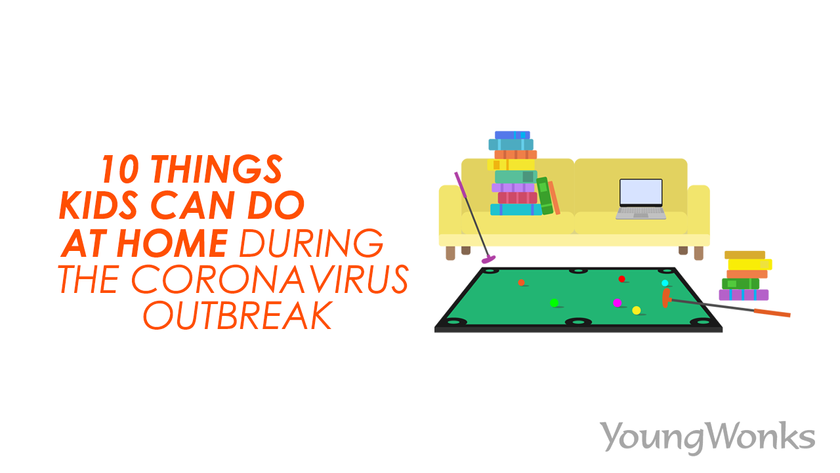Mar 24, 2020 By Team YoungWonks *
With the Coronavirus wreaking havoc across the US and the world, staying at home has become the norm. And even as grownups work from home or deal with the loss of work, what has also complicated matters is the shutting down of schools. Kids are now staying put at home too and this is a rather tricky situation to be in - for both parents and the kids. The situation seems even more dire for public schools which typically do not have a plan in place for these new circumstances.
So what are the activities that kids can take part in to put their time at home to constructive use? This blog shares with you ten things kids can do at home (in no specific order) even as we self-isolate ourselves due to the Coronavirus outbreak.
1. Online learning
We live in the age of the Internet, which not only translates into online bookings and deliveries but also a slew of online learning programs, many of which are free as well. In fact, several paid online classes are just as good as their onsite counterparts and it wouldn’t be wrong to say that some are even better.
California-based YoungWonks, for instance, is an after-school coding program offering online classes to kids. What’s more, it is an established online program with a set remote teaching plan already in place. And it boasts a 1: 1 student teacher ratio, which in turn means there is no dearth of individual attention. All this, together with their flipped classroom, self-paced and maker-friendly learning culture, makes for a winning combination.
Coding, however, is not the only subject kids can learn. Depending upon your kid’s aptitude, one can enrol him/ her into an online program focusing on a subject of his/ her choice. So be it coding, math, art, science or even music, stress-free learning without stepping out from your home is now possible thanks to online programs.
2. Online play
Today, we have Zoom, Microsoft Teams and other similar web-based video conferencing tools that allow users to meet online - both with and without video. This means not only can they be used for official meetings between grownups, but even online games and online play sessions with one’s school friends are very well within reach today.
3. Game time with the family
This is a great time to introduce your kids to a board game, jigsaw or even a puzzle. Even better, get the whole family to participate. For some time, you all get to be together and lose yourself in the game even as you forget the grim realities that envelop us today. There’s also the fact that board games help us - kids included - develop a problem-solving approach. Some of them are quite educational too. Some popular board games include ThinkFun Roll and Play board game (ages 18 months and above); Peaceable Kingdom Hoot Owl Hoot! Cooperative board game (ages 4 to 8 years old); Monkeys Up educational family game (ages 6 years and up); Brain Freeze (ages 5 to 10); Mattel Blokus game (ages 5 and above) and Settlers of Catan (ages 10 and above).
4. Relaxing the screen time
Given that you need to get your work done and the kids are very much at home, increasing the screen time is another way to keep the kids busy. However, it must be said here that time-to-time monitoring is advisable.
This is also a good time to steer them in the direction of some well-made, informative videos and documentaries which will help them expand their worldview. March of the Penguins, Disneynature’s Chimpanzee, National Geographic’s Jane, Ladies First on Netflix, He Named Me Malala and Batkid Begins are some examples of stellar kid-friendly documentaries.
Leading libraries and museums - think Washington D.C.’s National Gallery of Art and Smithsonian’s National Portrait Gallery; New York City’s Museum of Modern Art, Metropolitan Museum of Art and American Museum of Natural History, among many others - are now offering online viewing / virtual tours. So even though they have shut doors to their physical premises, their beauty and treasure trove of information are still up for grabs. Institutes such as the Denver Museum of Nature & Science have shared several fun ‘Scientist in Action’ videos on its Facebook page and website.
Bear in mind that several one-hour blocks a day are way better than letting the kids indulge in binge-viewing. That is a slippery road that one must avoid.
5. Nothing like the company of books
Cliched it may be, but books still make for great windows into the worlds we wish to experience and/ or acquaint ourselves with. Amazon’s current bestsellers for kids list includes books such as the Crime Travelers series and The 50 States, which explores the all American states with 50 corresponding fact-filled map. On the other hand, The Curious Incident of the Dog in the Night Time and The Boy in the Striped Pajamas are some of the all-time popular books, a reputation enjoyed by English classics as well. Colouring books are great pastimes too; so whatever be your kid’s age and interest, there’s a book out there to satiate his/ her curiosity. And now is as good a time as any to have your kid pick up that book.
6. Listen to a podcast
Podcasts, aka episodic digital audio files, are another contemporary source of information in the Internet age. Especially if you kid has exhausted his/ her screen time, there is no dearth of kid-friendly podcasts they can listen to on platforms such as iTunes, Spotify, and Google Podcasts The best part is many of these podcasts are free. But Why for instance is a good podcast for kids across age groups; Smash, Boom, Best and This American Life, meanwhile, are ideal for older kids.
7. Helping with / learning how to do household chores
Getting your kids - especially the older ones - to help with household chores is like hitting two birds with one stone. Schools may not reach them how to clean their room or help with cooking, but these are life skills one needs to learn and might as well get started now if they haven’t already!
8. More quality time with the family
Given that both you and your kid are not spending any time on travel and are instead spending it at home, use some of that extra time as extra family time. Sit with your child and make him/ her feel heard. Talk about each other’s day - even if it was spent right next to each other, you have been doing different things - and share your life stories and experiences. It is a great time to slow down and have your kids know you better.
9. Journaling / Writing
Writing and maintaining a journal can be a cathartic experience for one and it’s not too early to introduce your kids to it too. It doesn’t have to be anything profound; it can be something as simple as your kid jotting down how his/ her day has been so far and what they plan to do in what’s left of it.
10. Exercise
If journaling is an exercise for the mind, physical workouts are exercises for the body. This is not the time to treat the curfew as an excuse to stay put in one spot all day and not move around at all. Be it kids or grownups, some physical activity on a daily basis is absolutely necessary. Even within the house, there are plenty of exercises that need no equipment and very little space. In addition to keeping some time aside for your daily exercise, make your kids realise the importance of just moving around. A sedentary lifestyle can only lead to problems, so take care to make your kids realise this too.
Lastly, there’s one important thing to keep in mind with regard to the above pointers; and this is about parents recognising that each child is unique. So when you have your kid take part in any activity, try to make it about them by factoring in their age, aptitude and interests. Age-appropriateness, for instance, is key when it comes to consumption of content - be it through screens, online classes, podcasts or books. Similarly, forcing your kid to take up something they do not wish to is also not going to help them.
Also important is the need to revisit how we set our goals at a time like this. Try to cultivate an adventure mindset in your kids. Don’t make it a chore, make it a fun activity or challenge. And make sure they -and you - sleep well; a good night’s sleep remains vital to everyone’s wellbeing.
Creative Coding Projects for Kids During the Coronavirus Outbreak
As families continue to adapt to staying home during the Coronavirus outbreak, finding engaging and educational activities for kids has become a priority. At YoungWonks, we believe in turning these challenging times into an opportunity for learning and growth. Our Coding Classes for Kids provide an excellent platform for young minds to explore the vast world of programming from the comfort of their homes. For those interested in digging deeper into the world of computer programming, our Python Coding Classes for Kids are designed to teach the fundamentals of Python in a fun, interactive environment. Additionally, for kids fascinated by hardware and game development, our Raspberry Pi, Arduino and Game Development Coding Classes offer a perfect blend of education and entertainment. Encourage your child to make the most of this time by engaging in creative coding projects that not only keep them occupied but also significantly contribute to their skill development.
*Contributors: Written by Vidya Prabhu; Lead image by: Leonel Cruz

